| By Chilton Staff |
Your fuel pump is important for your car, and it would seem as if your vehicle couldn’t move without one. That’s not always true though. Some vehicles can limp along with a malfunctioning fuel pump for a few blocks or even miles.
But driving with a poorly performing fuel pump is not good for your vehicle, so it’s important to look out for signs of trouble before you end up stranded or stalled in traffic.
Like the name implies, the fuel pump pumps fuel from your vehicle’s tank to the engine. If the fuel pump malfunctions, your engine will receive less fuel than it needs. There are some common symptoms for such a situation.
The first and most obvious symptom is that your car may not start at all, or it might start poorly. This poor start will take the form of a sputtering, stuttering, stammering sort of start, as if your car’s engine is only getting a trickle of fuel instead of the amount it needs. Your car may also stall during operation because the fuel pump is bad.
Vehicles can sputter and stall for a variety of reasons, so here’s a follow-up test: Pull your vehicle into the garage or other silent environment. When it’s not running, put the key in the ignition and turn it to the “ON” or “accessory” position. (Don’t try to start the engine.) If you have fuel injection and an electric fuel pump, the pump should start up, making a clicking or buzzing sound.
After performing the above test, if you can’t hear the fuel pump turn on, try this test: Using a fuel pressure gauge, test to make sure there’s enough fuel reaching the engine. You can take your vehicle to a technician for this test or purchase a fuel pressure gauge at an auto-parts store and do it yourself. Near the engine, there should be a fuel pressure valve where you can attach the gauge. Find the recommended fuel pressure in ChiltonLibrary. Compare your measurement of the fuel pressure with what it should be. If there is less pressure than there should be, that’s a sign that your fuel pump may be faltering.
Not a subscriber? Learn more about ChiltonLibrary so your patrons can keep their cars in tip-top shape!

There could be a few other problems causing incorrect fuel pressure, such as an obstruction in the fuel line or a bad fuel pressure regulator. If your fuel pressure is too high, suspect the fuel pressure regulator.
For more information on diagnosing a fuel pump problem, check out Chilton’s online database of vehicles for detailed instructions, images, and tips from our certified expert technicians on determining whether you need to replace your fuel pump or fuel pressure regulator, clean out the fuel lines, or something else.


